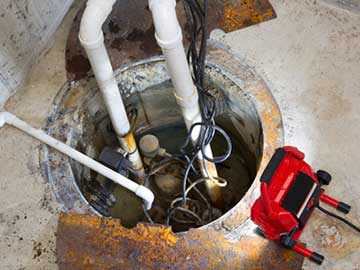
If you live in an area that is near a water table, or your home is at a lower level than your street, then your lower level or basement may be susceptible to flooding and a sump pump is recommended.
Sump pumps work to remove water from it’s surrounding area and deposit that water into a pit / basin which is a hole normally made in the basement or crawlspace level.
The size of sump pump for your specific situation depends on a few factors…
- Does your basement / crawlspace flood often? – If the answer is yes, then we recommend that you get a 1 HP sump pump with a battery backup because you will need as powerful a pump as is available.
- Will you choose a subermisble pump or a pedestal pump? – Your plumber can recommend which one is best for your situation. Both cost about the same.
How To Choose The Right Size Sump Pump
The most important factor in choosing a sump pump is the amount of horsepower it has. Sump pumps typically range from 1/4 HP (horsepower) to 1 HP. A pump with the wrong horsepower can actually do more harm than good.
If you are on a budget and can’t find a bigger sump pump for your home, a 25 HP pump may be just right for you.
There are a number of different components that make up a sump pump. The primary unit is the sump pit itself. The pit will house all of the water that the pump will be working with, and it will collect all of the solid material as well. When you learn how to choose the right sump pump, you should also know which components to look for in these devices.
There are two types of sump pumps available:
- submersible pumps – these go in a pit aka basin (that usually has water)
- pedestal pumps – these sit above the pit with the motor out of the water
The one additional consideration we would recommend when choosing a sump pump is to choose one with a battery backup. This will allow the sump pump to continue working even if there has been a power outage.
A sump pump that has a battery backup is an excellent choice for homeowners simply because it allows the unit to continue working in case of a power outage – which may also be caused due to inclement weather which could also bring about problems with flooding in your home.
Generally speaking, a battery could keep the sump pump running for 53 hours depending on how often the pump needs to run. We recommend you check the specs when purchasing your sump pump.
There is not much price difference between the two types of pumps but if you don’t already have a pit / basin for your sump pump then there may be an additional cost involved if you choose a submersible pump.
We would recommend to speak with a professional plumber about your specific situation and what the best type of pump would be for your home. It may be that a different type of pump would be recommended if you are placing it in a basement vs. a crawlspace.
What To Look For When Buying A Sump Pump
If you are in the market to purchase a sump pump or simply want to replace and/or update the one you currently have, there are a few things to consider:
There are manual and automatic pumps available. Obviously, automatic are a bit more expensive but far more convenient as you do not need to be home for the pump to automatically begin working when it’s most needed
Sump pumps typically range from 1/4 HP (horsepower) to 1 HP. We recommend you talk to your plumber about which best model of pump would work for your home.
Different pumps have different “head pressures”. This is the height that a pump can raise water. Remember, the pump pulls water away from the building so if it has to push the water uphill, you want to make sure that it can do that. If it has to push the water 2 feet up or 12 feet up – you want to purchase the pump that can handle that load.
An item often overlooked is the length of the electrical cord. You do not want to use an extension cord so you want a sump pump that has a cord long enough that you can plug it in directly into a GFCI (ground fault circuit interrupter) directly.
Backup / Alarms – purchase a pump that has an alarm notification system that suits your home and lifestyle. These are often small units mounted on the wall near the pump.
How Many Years Does A Sump Pump Last?
On average, sump pumps tend to last about 10 years. But we have seen some go out as early as 5 years and others last as long as 25 years.
Like most machinery, proper maintenance and the wear and tear placed on the pump will determine how long it will continue working for you.
If you have any questions about sump pumps or are having some problems with it, call Atlantis Plumbing today at 770-505-8570. We are available 24 hours a day, 7 days a week.